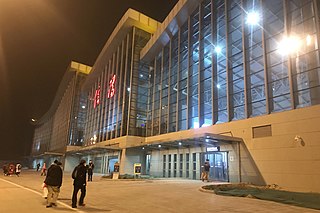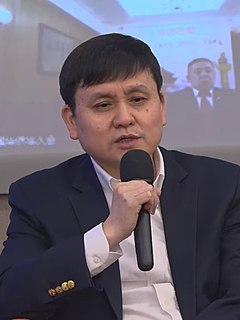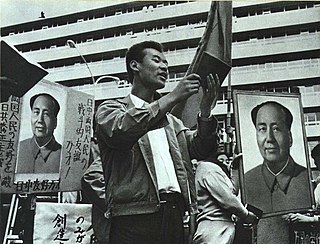
Xinyang Minggang Airport, or Minggang Air Base, is a dual-use civil and military airport serving the city of Xinyang in Henan Province, China. It is in the town of Minggang in Pingqiao District, about 45 kilometres (28 mi) from downtown Xinyang and 48 kilometres (30 mi) from the city of Zhumadian.
Shangqiu Airport, or Shangqiu Air Base, is a military air base near the city of Shangqiu in China's Henan Province. It is located in Guantang Township, Liangyuan District, 16 kilometres (9.9 mi) west of the city center. The airport was built in the 1930s and was known as Gui'deAirbase, and served in national defense operations during the Sino-Japanese Conflict, and the planning is to convert the air base into a dual-use military and civil airport with an estimated investment of 500 million yuan. The airport is expected to serve 300,000 passengers and 1,000 tons of cargo per year by 2020.
Fang Quan(zh: 方荃 – 字培卿, pinyin: Fāng Quán) was a late Qing Empire Mandarin, scholar, author and educator.

Hong Kong–mainland China relations refer to the relationship between Mainland China and Hong Kong. According to the 1997 Sino-British Joint Declaration, the United Kingdom handed control of Hong Kong over to the People's Republic of China, making it a special administrative region. In principle, Hong Kong became an autonomous administrative division based on the Hong Kong Basic Law.

Zhang Wenhong is a Chinese doctor, and a member of the Chinese Communist Party. He is the Director and Party Branch Secretary of the Department of Infectious Diseases at Huashan Hospital affiliated to Fudan University, the Director of the Internal Medicine Department of the Shanghai Medical College, and also the leader of the Shanghai Medical Treatment Experts Group, deputy director of the Shanghai Institute of Liver Diseases, and standing committee member of the Infectious Disease Branch of the Chinese Medical Association.
Cen Zeliu, also Shum Tsak-lau(Cantonese): was born in Enping, Guangdong, China. He trained in the Guangdong provincial aviation academy as a fighter pilot, graduating in 1934, and attached to the provincial warlord air force of General Chen Jitang. With the imminence of war between China and the Empire of Japan brewing ever since the Manchurian Incident of 1931, Cen Zeliu and his compatriots were indignant on taking the fight back to the Imperial Japanese invasion and occupation.

Mao Zedong, the longtime Chairman of the Chinese Communist Party and the founder of the People's Republic of China, was reported to have expressed his gratitude to the Japanese military and political figures who visited China in the 1950s and 1970s. Mao said that the Japanese invasion of China had awakened the Chinese people to solidarity. In the 21st century, these remarks by Mao caused strong reactions on the internet in China. With the 2020 Hong Kong Diploma of Secondary Education Examination (HKDSE) history subject controversy on the historical understanding of Japan's invasion of China, these remarks have returned to the spotlight on Hong Kong and mainland Chinese websites. Nevertheless, the word "thanks" expressed by Mao has been interpreted by many scholars as dark humour.



